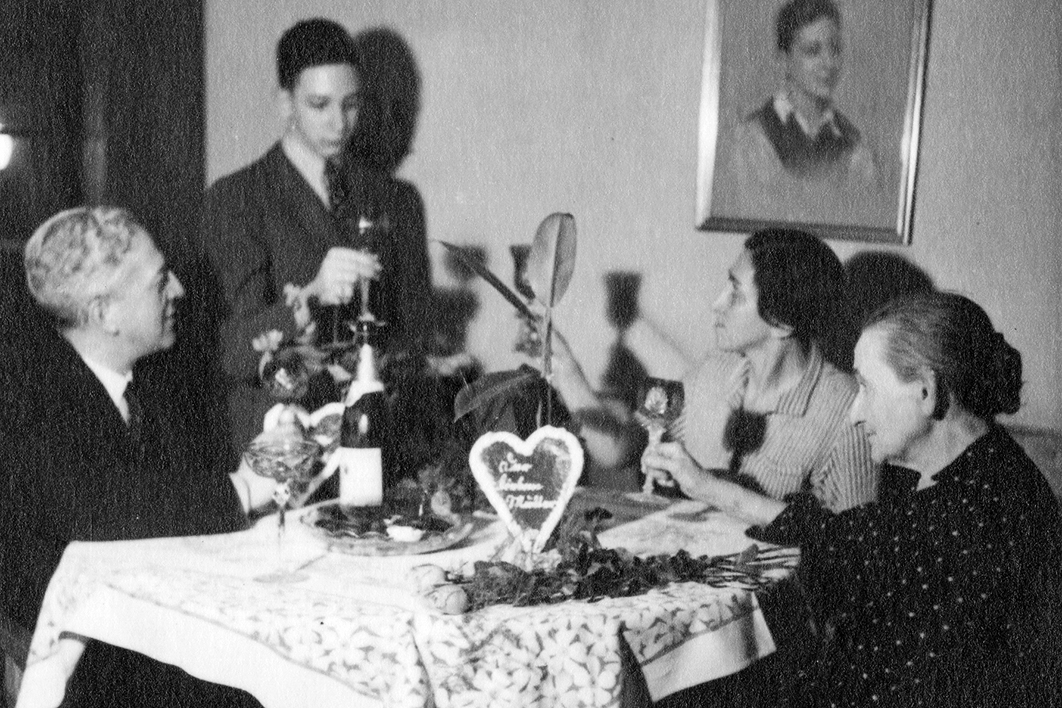Most of the 2050 or so Dunera internees — or Dunera boys, as they are commonly known — were German and Austrian Jews, many of them refugees from Hitler’s regime. In 1940, on Churchill’s orders, these “enemy aliens” were arrested in Britain and deported to Australia, where they were to be held for the duration of the second world war. The Dunera was the ship that brought them to Australia, and Bern Brent, who died last week at 100 years of age, was among the internees on board.
I was lucky enough to work with Ken Inglis and friends on Dunera Lives: A Visual History, published in 2018. The book is an attempt to tell something of the Dunera story through 500 images, one of which attracted far more comment than any other. This was a grainy black-and-white photograph from Bern’s collection taken on 14 December 1938, a month after the anti-Semitic violence of Kristallnacht.
The photo shows fifteen-year-old Gerd Bernstein (Bern’s original name), dressed in a suit, raising a glass to his family. His mother Helena, father Otto and maternal grandmother Sophie Maas sit at a table in their Berlin home at Wielandstrasse 17. A picture of young Gerd hangs on the wall.
The faces most exposed to the camera are those of grandson and grandmother. Gerd looks thoughtful and hesitant, even sad, while on his grandmother’s face I see both love and terror — love for him, and terror about what the future holds for her Jewish family. The next day Gerd left Berlin on a Kindertransport, bound for Britain. On 17 December, alone in Britain just two days after leaving home for a strange and unfamiliar country, he turned sixteen.
His parents survived the war despite his father Otto’s imprisonment in Theresienstadt concentration camp from 1942 to 1945. Otto was the sole survivor among the hundred people with whom he was transported to Theresienstadt; Sophie died there.
After the visual history appeared, Bern and I discussed readers’ reactions to this photograph and the intense, heavy sadness it prompted in many, me included. Bern would have none of it. He thought this response muddled, our emotions skewed by knowledge of the Holocaust.
In Bern’s mind, this photograph showed a moment in the life of his family, no more and no less. To view the photograph through the lens of the Holocaust was a mistake, and he made a point of reminding me that in 1938 the Nazis had not yet embarked on the systematic destruction of European Jewry.
Bern’s position on the photograph reflected his historical preferences. The substance of any history, Dunera’s included, is in the detail. He saw history through a lens that allowed little room for the floating of partly conceived ideas and none at all for speculation, no matter how worthy the intention. If there were a place for emotion, it was after the facts were established. Perhaps his approach could be called traditional. I can’t imagine Bern thinking much of the modern belief that histories can be retold on the basis of emotions.
Whatever the merits of Bern’s approach, it made him a wonderful informant. His view of the past as the stuff of hard facts meant that he spoke only about what he knew. If he didn’t know the answer, he said so. If he thought the question irrelevant, he made that clear too, then explained why. He punctured myths, of which Dunera has more than its share, and raised questions that forced historians and others to think anew about key moments in the story.
Recently I asked him about an incident that looms large in Dunera history and memory. On the voyage to Australia, British guards treated the internees with calculated brutality in a gross, and in some cases criminal, dereliction of duty. The Dunera canon tells that guards, as part of this sustained assault, forced internees to walk over broken glass strewn across the deck of the ship.
The glass was there, Bern told me, but he doubted it was placed deliberately, and he and others simply stepped around it. While the weight of evidence about this incident is against him, I know that Bern, as a historian of the Dunera, never spoke idly. On that basis alone, his account demands consideration.
Ken Inglis cherished Bern’s clarity and commitment to accuracy. They corresponded from the start of Ken’s Dunera project — which also led to a second book, Dunera Lives: Profiles, in 2020 — exchanging emails regularly until Ken’s death in December 2017. Their voluminous correspondence, now part of the Inglis Dunera papers at the National Library of Australia, reveals two scholars in respectful and admiring conversation, one testing notions and ideas, the other encouraging or discouraging those possibilities.
While Bern was an oracle on Dunera, on one aspect of the story he had no answers. When the Dunera internees arrived in Australia, most were incarcerated first at Hay in western New South Wales. Because the camps there could house only 2000, around ninety-five of the internees, seemingly chosen at random, were taken instead to Tatura in Victoria’s Goulburn Valley, along with other men who had travelled on the Dunera and been deemed dangerous by British authorities.
Bern was part of this Tatura rump, and there he stayed for the duration of his internment, which lasted until January 1942. Thus, he knew nothing of camp life at Hay. Ken would chuckle at this inconvenience, suggesting that Bern had been remiss in not arranging his internment to suit the needs of future historians.
Bern exerted a strong influence on the writing of the two volumes of Dunera Lives, saving us from mistakes and misinterpretations, and suggesting lines of enquiry that emerged as themes in the books. He was our most prolific and important informant. If our telling of a story differed from the one he knew, he always gave our version a fair hearing. On the odd occasion, we might even have convinced him.
On other occasions, not at all. In Dunera Lives we took a strong line on Winston Churchill’s role in the Dunera affair. While Churchill’s wartime government would later issue an apology of sorts to the Dunera internees for the appalling treatment they suffered, by that time many had already concluded that British liberalism was a chimera. Bern was of the opposite view. He held that Churchill had no choice but to act as he did, and that to suggest otherwise was to allow historical judgement to be derailed by the luxury of hindsight.
This position was entwined with another view to which Bern stuck fast. The Dunera had delivered him to Australia, where he made a rewarding and productive life. As he said often, there was nothing for him in postwar Europe, whereas in Australia, as a young man with energy and purpose, he was able to embrace education and new beginnings, free of the restrictions and prejudices that had shaped his life in Germany.
For Bern, his good fortune was the story, and this mattered more than issues such as the question of Churchill’s culpability. He thought the Dunera the luckiest thing to ever happen to him. Perhaps the fact that his parents survived the Holocaust also influenced this position.
Bern was an unusual Dunera boy in other ways, too. While happily Australian, he maintained strong links to his homeland. He returned to Berlin and Germany often, visiting past haunts and chasing up friends. He continued to speak and read German, and listened to German news on the radio. A couple of years ago Bern wrote to tell me about the Exilmuseum in Berlin, after he had heard mention of the nascent institution on a German radio program. He wondered if the museum’s curators would be interested in learning about the strange story of the German and Austrian exiles who in 1940 found themselves interned in rural Australia. They were.
For other Dunera boys, such engagement with Germany and Austria was anathema. Their wartime experiences and knowledge of the Holocaust poisoned their feelings for the land of their birth. Many never returned to Germany and Austria; many chose to avoid Germanic culture and language.
Bern too knew the pain of persecution and the tragedy of the Holocaust. Anti-Semitism forced him and his mother to flee Germany for Britain. Hitler’s regime murdered his grandmother and imprisoned his father. But never did he allow the pain and injustice of the past to determine the direction of his life. It was a remarkably brave choice, and one that not all Dunera boys were able to make, or even wanted to.
Bern’s longevity conferred a sad and perhaps unwanted title. He was the last Dunera boy in Australia, and among the last anywhere. It is thought that there is a Dunera boy alive in France, and another in New York, and possibly others of whom my colleagues and I don’t know, though it is unlikely that these “unknowns” would number more than one or two.
Bern accepted his position with grace, acknowledging the dubious honour as a responsibility rather than a burden, which surely it was. To the best of my knowledge, he never refused a request for an interview, and was diligent in answering questions from scholars and members of the Dunera diaspora. Perhaps he saw duty in these tasks; the Dunera had led him to a good life in Australia, and provided both a scholarly purpose in his later years, and enduring friendships.
On what proved to be his last weekend, Bern travelled to Melbourne, where he delighted in the company of Peter Danby’s family. Danby, originally Peter Danziger, was also a Dunera boy, though the friendship was older than that, the two having met in Britain. Bern was accompanied by Peter and Joanna, two of his three children. The Brent–Danby friendship is now carried by the next generation.
In September 2022 I took the British author and activist Jennifer Nadel to meet Bern in his Canberra home. Jennifer’s father, George Nadel, was a budding scholar when he was deported to Australia on the Dunera. She knows little about his internment, but enough to realise that George’s postwar silences hid deep trauma. For Jennifer, Dunera has been a difficult and painful word.
Aside from their Jewish heritage, George Nadel and Bern had little in common. George was born Austrian, Bern German. Both had a passion for history, though they were driven by differing approaches and emphases. George, who went on to found and edit the venerable journal History and Theory, was an academic who practised history in more formal worlds and ways than Bern. If Bern were ever a reader of that journal, I imagine him warming more to the history than the theory. Bern saw the Dunera as a ship of salvation; for George, the Dunera seems to have heralded only misery.
And yet both men survived the Dunera, and by 2022 Bern was one of very few people anywhere in the world who could talk directly of the experience. Through Bern, Jennifer was given a privileged glimpse of a past about which George never spoke. As we drove away from Bern’s home, she said that his German-accented English, and certain of his mannerisms, evoked fond thoughts of her father.
When I wrote to Jennifer to tell her of Bern’s death, she immediately recalled his bearing and presence, and the importance to her of their meeting. Bern’s willingness to act as a conduit to the past, to talk openly and directly about Dunera, helped many people like her to better understand the story and their part in it. In so doing he aroused emotions. I wonder what he made of that.
Jennifer described meeting Bern as a privilege. It’s the right word. To have known, talked and corresponded with him was a privilege, and something I cherish. Ruhe sanft, lieber Bern. •




